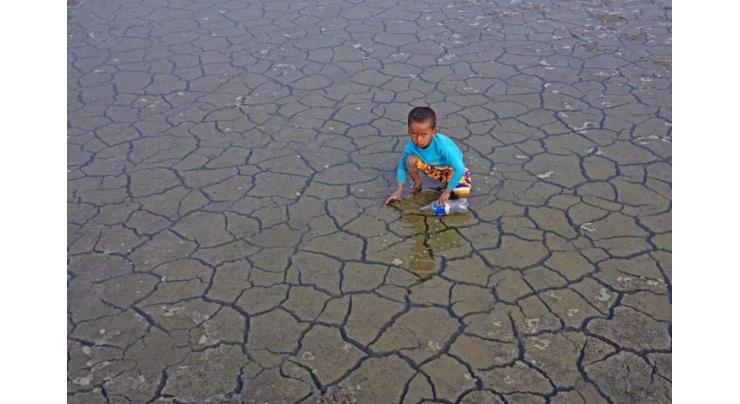
5-billion People Face Inadequate Water Access Due To Severe Climate Change
Fahad Shabbir (@FahadShabbir) Published November 29, 2022 | 09:55 PM

More than five billion people are expected to face a shortage of access to clean drinking water at least once a month each year by 2050 as a result of extremes such as flooding and drought, the UN said on Tuesday
ISLAMABAD, (UrduPoint / Pakistan Point News - 29th Nov, 2022 ) :More than five billion people are expected to face a shortage of access to clean drinking water at least once a month each year by 2050 as a result of extremes such as flooding and drought, the UN said on Tuesday.
Climate change is reducing river levels and melting glaciers as global temperatures are more than 1.1C higher than in pre-industrial times, according to a report by the UN's World Meteorological Organsiation (WMO).
Large areas around the world have been drier than usual last year, when precipitation patterns were influenced by climate change, the report said.
The report, named The State of Global Water Resources for 2021, is the first comprehensive review of water resources by the WMO, The National UAE reported.
It will be published on an annual basis starting from this year due to calls for more accurate data in a time of increasing demand and limited supplies, WMO said.
"Currently, 3.6 billion people face inadequate access to water at least a month per year and this is expected to increase to more than five billion by 2050," said the report.
From 2001 to 2018, 74 per cent of all natural disasters were water-related, according to UN studies.
The report highlighted that inconsistent measurements and a lack of data collected on the ground made it hard to understand some of the effects that climate change was having on water systems.
At Cop27, the recent UN climate change conference held in Egypt, governments were urged to further integrate water into adaptation efforts.
The WMO secretary, Prof Petteri Taalas, said climate change effects were usually felt through water in the form of more intense and frequent droughts, flooding, erratic seasonal rainfall and melting glaciers.
"With cascading effects on economies, ecosystems and all aspects of our daily lives, there is insufficient understanding of changes in the distribution, quantity and quality of freshwater resources," he said.
The report said about 1.9 billion people lived in areas where drinking water was supplied by glaciers and snow melt but these glaciers are melting increasingly fast.
The report said governments must increase their actions in introducing of early warning systems for floods and droughts to help reduce the effects of water extremes.
Related Topics
Recent Stories

At least 10 people killed in Brazil fire: officials

Shahzaib Rind calls on Deputy Speaker Balochistan

Ahsan chairs 13th CPEC-JCC preparatory meeting, reviews arrangements for high-le ..

DC Tharparkar inaugurates anti-polio campaign

HDA Mehran workers demand salaries

Taxila police nab motorcycle lifter gang

Inter-university weightlifting championship kicks off at SAU

Walk held in a series of enrollment campaigns

Team from Gaza mediator Egypt arrives in Israel for truce talks

Kids murders: IHC orders psychiatric examination of mother

Health minister credits PML-N for advancements in organ transplantation

Court grants interim bail to Azam Swati in cyber crime case
More Stories From Pakistan
-

DC Tharparkar inaugurates anti-polio campaign
50 minutes ago -

HDA Mehran workers demand salaries
56 minutes ago -

Taxila police nab motorcycle lifter gang
54 minutes ago -

Walk held in a series of enrollment campaigns
54 minutes ago -

Kids murders: IHC orders psychiatric examination of mother
54 minutes ago -

Health minister credits PML-N for advancements in organ transplantation
53 minutes ago
-

Court grants interim bail to Azam Swati in cyber crime case
53 minutes ago -

Commissioner chairs meeting of divisional task force for polio
53 minutes ago -

Abuser boy arrested in Taxila
53 minutes ago -

Drugs peddler gets 9 years imprisonment
49 minutes ago -

03 youngsters killed after tractor trolley runs over motorcycle
49 minutes ago -

Climate change poses severe threats to Pakistan, Balochistan: Samina Zehri
50 minutes ago











